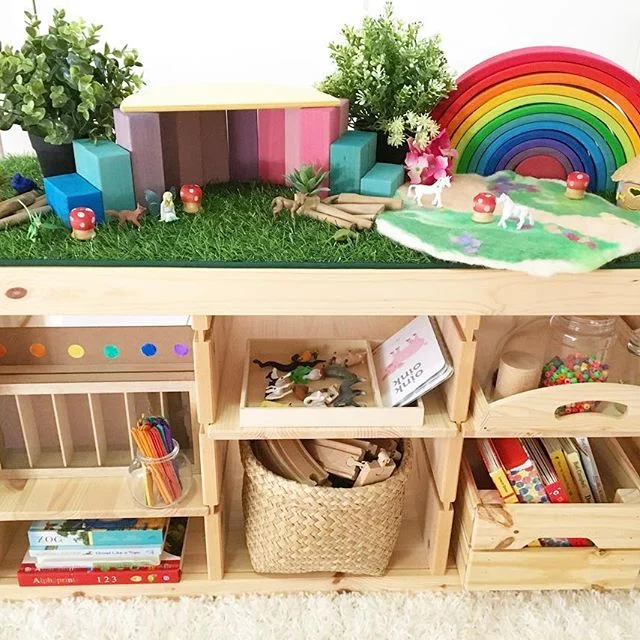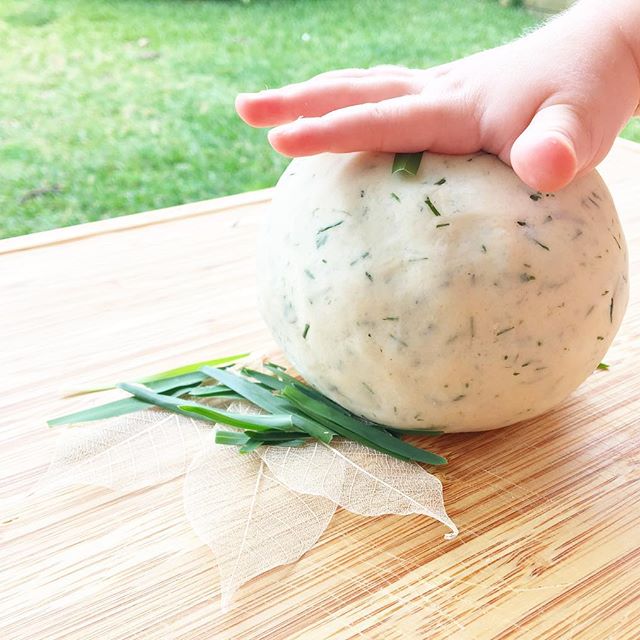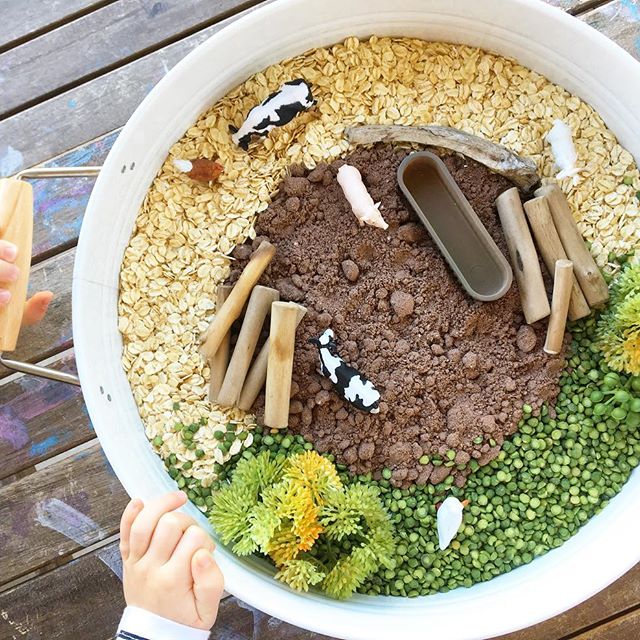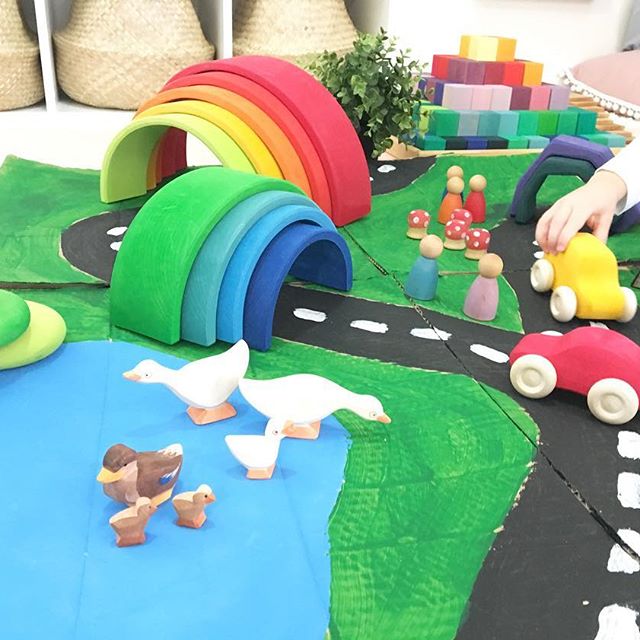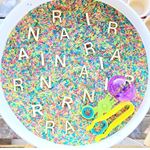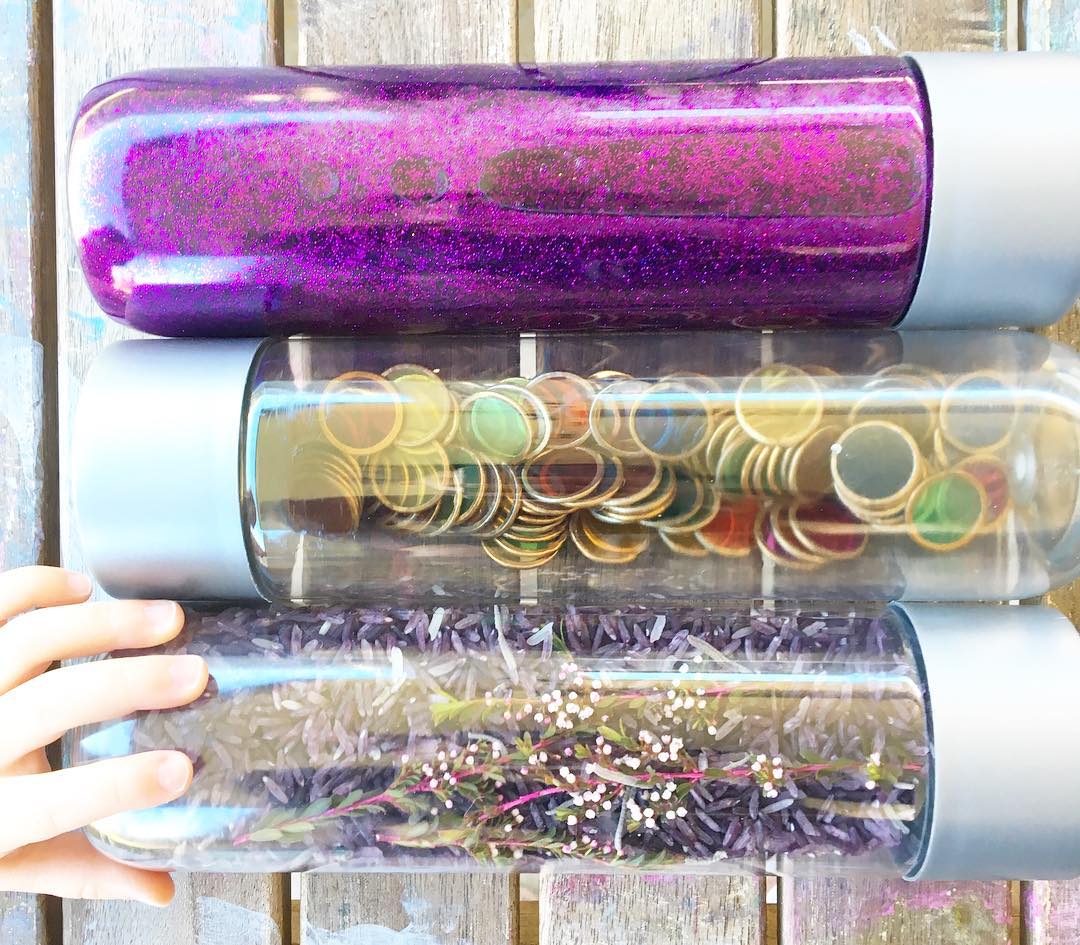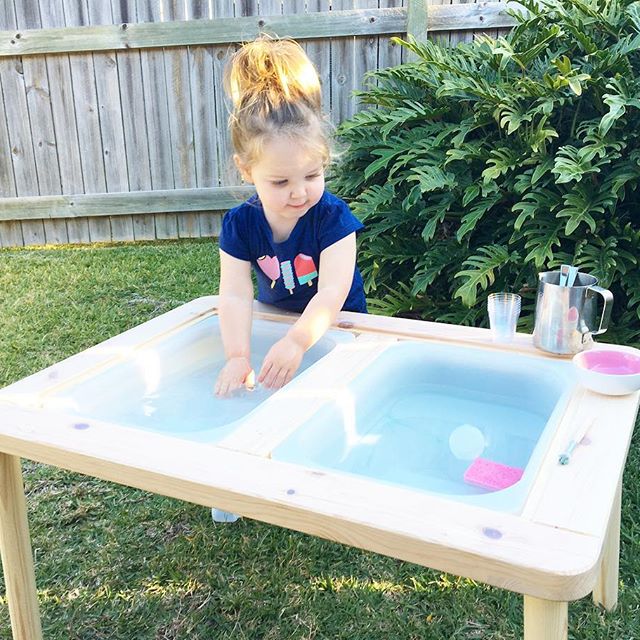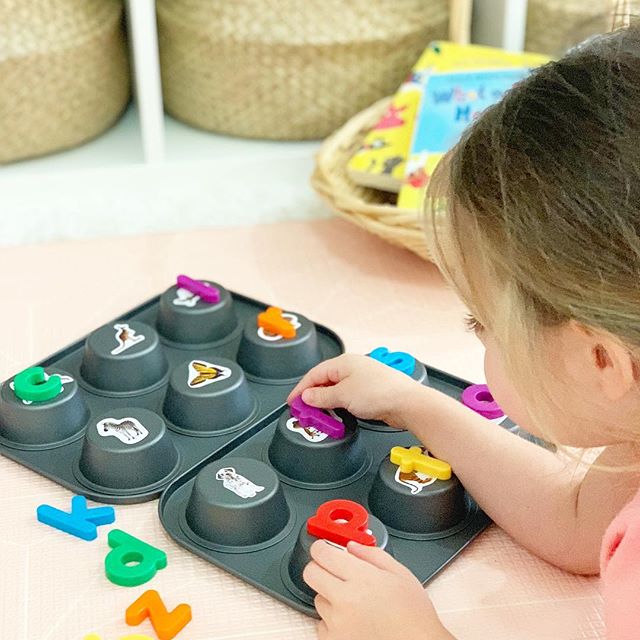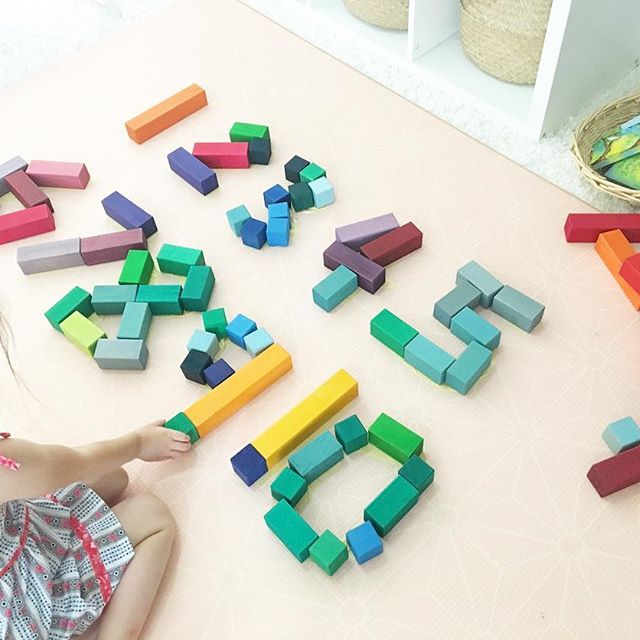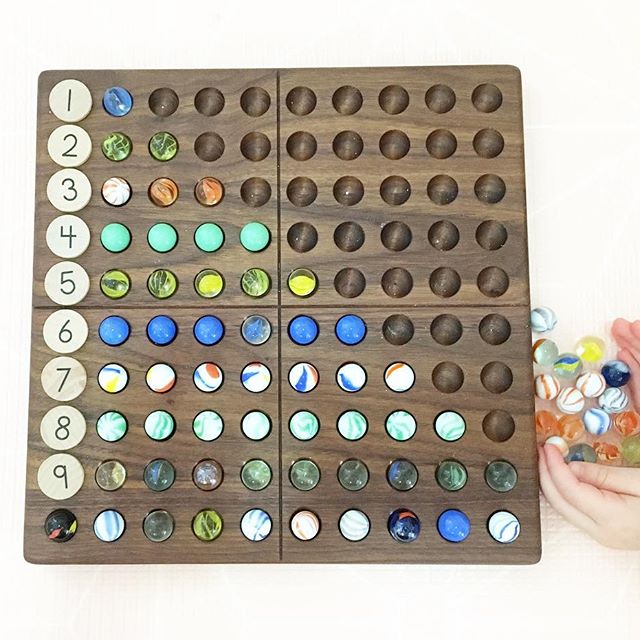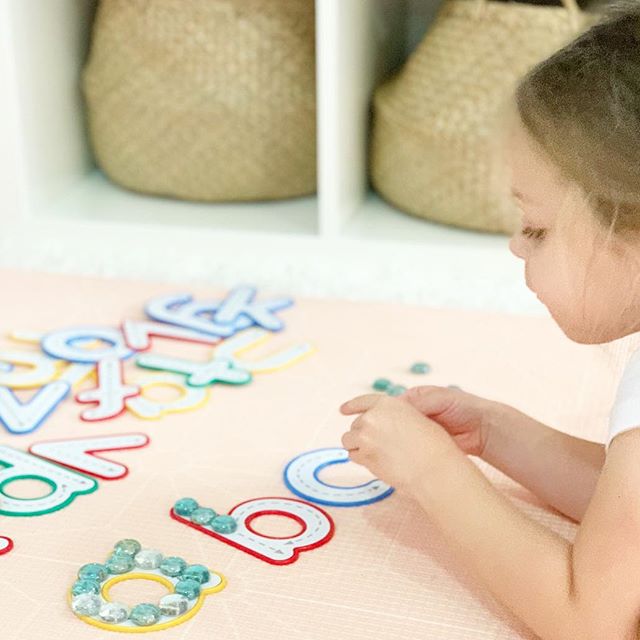Juliet, 4 and Ariana, 2.5
We’re modern mums right? So the epic summer holidays are approaching and what is going through our minds? How to combat the inevitable outcome of two much screen-time as we (a) try to rack our brains for ways to occupy our kids and (b) try not to start day drinking! When it comes to ideas for school holiday activities, I’ll admit I triumphantly conquer baking, craft and a few excursions before finally slumping into the sofa, booting up Netflix and admitting defeat.
That was until I discovered the wonderful, and yes inspiring, feed of stay-at-home Mum and army wife, Emma aka @play_at_home_mummy. With a background in early childhood and primary school education, Emma has brought her passion for teaching and learning through play into her own home, for the benefit of her own two daughters, aged 4 and 2.5.
Sharing their daily playroom adventures with her Instagram followers, Emma has a whole heap of accessible educational ideas to help you keep your little (and big) ones entertained at home. She shared with us her thoughts and tips on DIY play, incorporating words and numbers into your everyday, how to buy for play within budget and navigating the dreaded screen-time! And so much more…
Read on and consider this your pre-School holiday prep!!
TLH: what was your journey to become so invested in education through play?
Emma: I’ve always been an advocate for play based learning because of my early childhood training - I have both studied and seen in context how important play is in childhood! I worked hard as a primary school teacher to bring this play-based approach into the classroom (instead of the more formalised sit-and-learn structure) as I feel it is how all children learn best - Far beyond the early years children gain the best learning out of a play-based and child-led curriculum!
It has been very natural for me to bring this belief into my own parenting and I see learning as a very natural part of childhood - we are constantly learning through play and interactions in our home
TLH: where do you get your inspiration for each new play idea?
Emma: I never stop thinking about play; most of my ideas come from my own kids - I will see what they are playing with or what they are interested in and think about how to best extend on that. Lots of ideas also come from other amazing Mums and teachers out there on Instagram - it is an absolutely incredible place for ideas!
TLH: do you have particular items that feature as staples in a variety of play set ups?
Emma: Yes! Our Grimms rainbow and blocks from our large stepped pyramid are always used in my set ups. Our animal figurines (mostly Collecta minis) are also featured all the time. Nature loose parts are also always used - rocks, sticks, pebbles, leaves etc. Scoops/Spoons/Bowls/Cups are always used here as we do a lot of sensory play.
And cars; the girls love their cars and trains!
TLH: what basic items found in most homes are good to help Mums start off with when venturing into learning through play?
Emma: Oooh so much! Bottle caps, egg cartons, plastic bottles, sensory ingredients (eg. Playdough ingredients - flour, oil, salt, food colouring; and other sensory play items such as rice, dried pasta etc), shoe boxes, utensils (spoons, whisks, saucepans), pegs, containers, chopping boards, salt/pepper shakes or spice jars, paper towel roll holders, rubber bands, ice cube trays, mirrors, muffin tins, Huggies wipes boxes, buttons, tongs, toilet rolls/paper towel rolls, empty chocolate boxes, cookie cutters. I could go on; the list is truly endless!
TLH: how do you structure your daily play ideas? Do you pre-plan? Is there a mix of pre-planning and spontaneity?
Emma: There is definitely a mix of both!
I do a playroom rotation roughly once a fortnight where the whole playroom/house is given an overhaul and activities are rotated round. I do this because the majority of the girls’ everyday play comes from the activities and toys that I rotate in the playroom, so I want to make sure they are all relevant.
Then day-to-day we do one guided activity per day, usually in the morning, which I will prepare and play with alongside the girls. I generally decide on what I’m going to do either the night before or the morning of. These activities come from a very long list of ideas I have so I don’t generally run out of ideas or get stuck for what to do, because there is plenty on my list!
They are a mix of sensory/small world/nature play as well as anything else which I feel will be beneficial for the girls (eg. letter or number tasks, problem solving/puzzles, art/craft etc.)
The rest of the day is free play around our daily routines and I step in and modify/teach as I see opportunities!
TLH: is it essential to have a designated playroom? What is your advice in terms of setting up a play area without a playroom?
Emma: It’s definitely not essential, and for people who don’t have the space for a whole playroom I would advise them to look for any spare/dead spaces in their house, no matter how small, and set up a small shelf or a table and chair or even a fold-away table (we have a little tray table in our playroom that would be perfect for placing little activities on and then folding away at the end of the day!) and perhaps rotate the activities/toys in these spaces more regularly to keep up with children’s interests. Instead of having a designated play room you might end up with several play ‘areas’ - which is totally fine and just as effective!
TLH: do you have a monthly budget for play spend? How do you research the tools you need?
Emma: I don’t have a ‘budget’ as such - I just have a long list of things that I want for the girls and I prioritise the things on that list when we have spare spending money. Some items I am able to buy as soon as I want them (if they aren’t expensive), whereas more expensive items we need to budget for specifically and save for. And afterpay helps a lot with these things! (Scroll to the end for a list of stockists that Emma uses to furnish her playroom)
TLH: do you feel a pressure to be constantly coming up with things to do or is there always an idea you can pull out the bag?
Emma: I do have the occasional day where I feel uninspired - we all have those days! But mostly I always have something I can pull from as I have a very long list of ideas and activities to try
TLH: is it important for a child to be bored sometimes?
Emma: Yes! I only plan one guided activity per day - the rest of the time the girls are playing on their own and entertaining themselves when they are bored - though they aren’t often bored, they have pretty good imaginations and spend most of their days very busy! But if I was entertaining them all day, they would never have had the opportunity to develop their imaginations!
The way I see it, is I provide the environment for which they will play and learn - and they do the playing and learning part.
TLH: what is your take on screen-time? How do you navigate it with your own children?
Emma: I don’t judge anyone for using screens with their children - we all have times in our lives when we need screens just to cope, for example during sickness, the arrival of a new sibling etc. and during these times I’m happy to use screens as needed! When things are normal, (so the majority of the time) the girls watch about 20 minutes of TV per day (broken up into two 10 minute sessions - after lunch and after bath), and have no other screens (no iPads etc). They don’t ask for TV because it’s not part of the routine - they just spend the day playing! I do think that their capacity for independent, imaginative play, as well as concentration, is extended with limited screen time.
TLH: what are your favourite themes of play activities for the school holidays?
Emma: Small world play is one of my and the girls all-time favourites!! It can be adapted to most ages and interests which is a big bonus! And nature play is a great one for holidays as it gets you out and about!
TLH: are there specific activities that help with literacy? Similarly with numeracy?
Emma: Literacy - reading all the time, talking about the words and sounds you are reading, and having discussions with your kids - about anything! Just talking all the time. How children talk (how they form their verbal sentences and structure their thoughts) is how they will eventually write. If you want kids to form logical, structured and intelligent sentences in their writing, they first have to be able to do it with their words.
Have words everywhere - label everything, make it clear that words have meaning.
Have letters everywhere - even when your children are too young to recognise them - because they will eventually be the start of conversations and spark interest and by making them ‘normal’ you are making that learning normal and part of their everyday lives.
Numeracy - the same! I’ve had a number line on our dining table for the last 2 years but it’s so great because it’s this normal thing that Miss 4 now uses when she’s finished her dinner just to casually start counting - and she does this every day! Without me forcing her, she is just naturally reinforcing number concepts for herself all the time!
Another really great thing for numeracy is hide and seek - just gradually increase the number you are counting to each time you play! We now count to 40!
And the same as with words - just have numbers everywhere, in activities even when they don’t recognise them (those tactile, magnetic numbers are great as they can be used all the time!) and talk about them. When you are reading a book, count the trees in the book, count how many eyes the animals have etc.
Play with loose parts and count how many there are, then put a numeral next to it so they begin to recognise that 1:1 correspondence.
It’s really just about integrating learning into everything you do all day long - which is just second nature to kids!
TLH: what are your top 5 favourite play activities?
Emma:
Sensory play - rice is our favourite!
Small world play - love the Kmart play tray for our small worlds!
Nature play - because it’s so beautiful and easy and free!
Book play - reading is something that we never stop doing!
Block play/building - there is so much great learning and problem solving that comes from a set of good building blocks!
Emma’s Preferred Stockists
For Toys:
Oskars Wooden Ark
Works at Play
Growing Kind
Invitation to Play
Educational Experience
For Furniture:
Ikea
Kmart
Bunny Tickles

